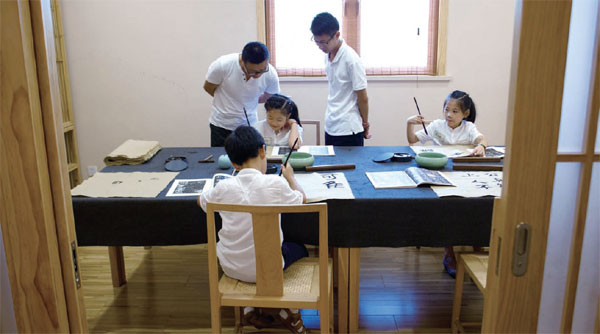When everything old seems to be gold
Updated: 2016-09-09 11:26
By Yu Ran in Shanghai(China Daily USA)
|
|||||||||
|
Going back in time: children learn how to do calligraphy writing during a class at Luheyun Institute. Gao Erqiang / China Daily |
From writing calligraphy to reciting ancient poems to performing martial arts, traditional culture courses for children are currently the new craze among anxious Chinese parents who want their kids to stay ahead of the competition
Dressed in clothes styled to look like those from the Han Dynasty (206BC-AD220) that ruled China 1,800 years ago, a group of children aged between 5 and 10 years old are reciting ancient Chinese verses as their heads sway away from side to side.
In another room, children are learning about calligraphy, wielding writing brushes and figuring out how to use ink sticks and inkstones.
Instead of taking piano lessons or joining an overseas study tour, these kids are spending their summer vacation learning about traditional Chinese culture in a tranquil space at the Luheyun Institute in Shanghai that features a minimalist design concept inspired by the Song Dynasty (960-1279).
Established by Liu Yuping, the Luheyun Institute is a traditional academy-styled space that hopes to raise more interest and awareness in children about traditional Chinese culture which is quickly fading from society in this modern era.
According to Liu, traditional Chinese culture, or guoxue, refers to any field of studies that is traditional and native to China, be it Confucianism, Taoism, historical writings, ancient poems, traditional Chinese paintings and traditional Chinese medicine.
"In today's world, one where people are obsessed with piano, Olympic-level math and Disney-inspired English, traditional culture has been absent in a modern child's development," said Liu.
"Guoxue is essential in helping form a child's way of thinking and understanding about life and love, allowing them to be confident and optimistic."
Liu said that the teaching methods currently used at Luheyun Institute, which rely on games, performances and story-telling to help children learn more effectively, was a result of her experience in Western early education pedagogy, which has an emphasis on learning while playing.
She has experience in this field because, apart from running Luheyun Institute, she is also in charge of Gymboree Corp's expansion into the Chinese market. The American company is a global provider of children's apparel and early education programs.
Students enrolled in the Luheyun Institute are mostly aged between 4 and 13. There are currently only half-day and one-day courses where children learn about calligraphy writing, poem reading, traditional tea making and traditional medicine preparation.
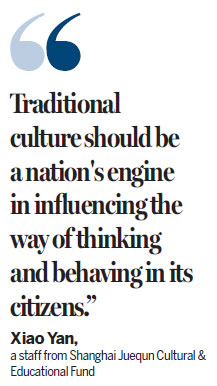
"We apply the Analects of Confucius and Qianjiashi (a collection of Tang-Song poems) to foster a love for reading and encourage the children to explore the art and beauty in daily life," said Liu.
"No matter what career the kids decide to pursue in the future, they first have to learn how to be a moral person, learn the origins of their culture, explore the wisdom of ancient civilization and pass on the essence of culture further."
Monica Mo, the mother of an 8-year-old girl, felt that she had made the right decision to have her daughter spend the summer holiday learning the charm of traditional Chinese culture.
"The Confucianism thoughts have taught my daughter to be more polite, self-disciplined and gentle. She also gets to learn things about Chinese history and culture that cannot be found in the curriculum in school," said Mo, who believes the course will have a positive long-term impact on her daughter.
Over at Jade Buddha Temple in Shanghai, 30 kids aged from 8 to 12 years old are taking part in a summer camp organized by Shanghai Juequn Cultural & Educational Fund.
During this five-day camp, the children live in the temple, consume vegetarian meals, read ancient poems, perform martial arts and even learn dizigui, a Chinese book dating back more than 300 years that lays out standards for being a good child and student.
"Traditional culture should be a nation's engine in influencing the way of thinking and behaving in its citizens. We are aiming to combine the concept of a summer camp and guoxue to sow the seeds of morality in children," said Xiao Yan from Shanghai Juequn Cultural & Educational Fund.
Since November 2015, the fund has been introducing free guoxue courses for kids aged from 7 to 12 years old to learn about Confucian classics, calligraphy and Chinese painting.
"We don't have any exams or charge any fees for attending the courses as we just want to shape the characters of children and teach them about good manners and habits through traditions," said Xiao.
"We're expecting to receive an increasing number of requests from parents to enroll their children in guoxue at an early stage as they believe this is an important phase in their development."
Industry players, however, have noted that many parents have been mindlessly jumping onto the bandwagon without considering their children's interests.
Wang Shuangqiang, the founder of Shanghai QinHan-HuTong Education & Training Co. Ltd, said that some parents today are sending their children for such courses not because they thoroughly understand the value of such studies, but because they think learning about traditional concepts might give their children an edge over their peers.
"More and more parents are becoming keen on sending their children abroad to further their studies so they just see guoxue as a sort of unique Chinese label that will allow their kids to stand out from the competition," said Wang.
Qin Han HuTong, which offers guoxue courses to adults and children, has been a market leader since its establishment in 2006 and is expected to own more than 40 branches across China by the end of this year. It currently teaches about 25,000 children aged between 4 and 18 years old and 4,000 adults.
According to Wang, his company's sales revenue for children's guoxue courses have experienced a 100 percent growth every year for the past two to three years because of this craze. This has in turn resulted in price hikes from different guoxue providers.
However, Wang is adamant about not doing so as he wants to make such education accessible and affordable to everyone. At Qin Han HuTong, the cost of having two 45-minute lessons every week for a year is about 8,500 yuan ($1,272.6). Most of the other institutions have hiked their fees to over 10,000 yuan, with some even breeching the 20,000-yuan barrier.
"We're still losing money in a bid to retain our beliefs in passing on the knowledge of traditional culture, although the market is sadly becoming a profiteering industry where many greedy entrepreneurs just want to make a quick fortune from this opportunity, without caring about the quality," said Wang, who added that he will continue searching for a solution to gain profits while offering high-quality traditional culture courses.
Earlier this year, Wang introduced a new classic literature course into the current curriculum at Qin Han HuTong which covers traditional instruments, calligraphy, Chinese painting, weiqi (or GO) and traditional opera. This new literature course aims to help children achieve an open and peaceful mind through the study of philosophy, hermeneutics and aesthetics.
"Hopefully this learning of traditional culture will help calm people down and allow them to feel the quiet and inner peace through our nation's precious ancient poetry," said Wang.
Besides over-zealous parents, the central government has also played a part in the current guoxue craze. In April 2014, the Ministry of Education issued a guideline regarding the teaching of traditional Chinese culture from primary school through college. The guideline stipulated that more lessons on traditional Chinese culture are to be included in primary and middle school textbooks.
President Xi Jinping echoed this view too when he visited Beijing Normal University in September 2014, voicing his disapproval of decisions to remove classic Chinese poems and essays from textbooks.
"China's cultural genes should be planted in the minds of the young," said Xi.
In response to this guideline, China's Language and Culture Press, one of the most authoritative publishers of school textbooks, has revised the content of its Chinese language textbooks by raising the proportion of traditional culture from 30 percent to 50 percent in 2015. The new version of Chinese textbooks has been used at schools nationwide since the new semester began on September 1.
However, certain parents are skeptical about the need to add more traditional culture content into textbooks.
"I don't think the revised version of Chinese textbooks will change the modern way of thinking and behaving among the children. I think children might actually get confused with these ancient literature texts that are hard to relate to in today's modern settings," said Hu Qinyan, a mother of a 10-year-old primary school student in Shanghai.
Prestigious universities such as Tsinghua and Peking have also established research centers that feature a focus on Confucianism. Wuhan University in Hubei province even offers a PhD degree in guoxue. The university produced its first Doctor of Guoxue in 2012.
"It is a good sign that more people are aware of the importance of learning traditional culture, but unfortunately the number of guoxue experts remains very low in the country as there has been a huge pause in the education of traditional culture for years," said Xiong Bingqi, deputy director of the 21st Century Education Research Institute.
"The current trend of guoxue learning can be considered healthy, but the industry needs to be adjusted so that there is lesser commercial motives and more guidance from experts who understand the true essence of traditional culture studies."
yuran@chinadaily.com.cn
- Three women planning 'imminent' attacks arrested in France: minister
- China, Britain vow to deepen military exchanges, mutual trust
- British parliament to debate second Brexit referendum petition
- Chinese women find their way through the glass ceiling
- Rousseff leaves presidential residence in salutation
- Thousands of Chinese rally in Paris to call for 'security for all'
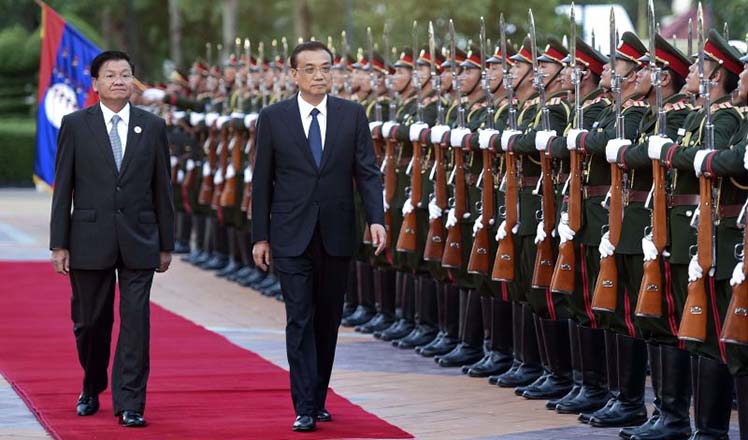
 Sights and sounds of Premier Li's visit to Laos
Sights and sounds of Premier Li's visit to Laos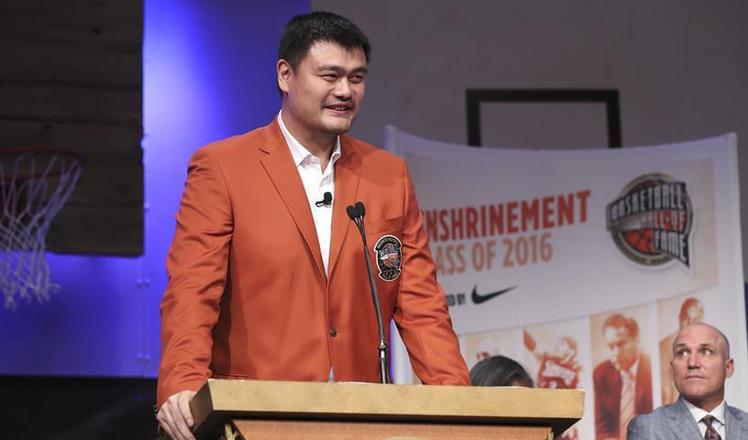
 Yao Ming and Class of 2016 receive Hall of Fame jackets
Yao Ming and Class of 2016 receive Hall of Fame jackets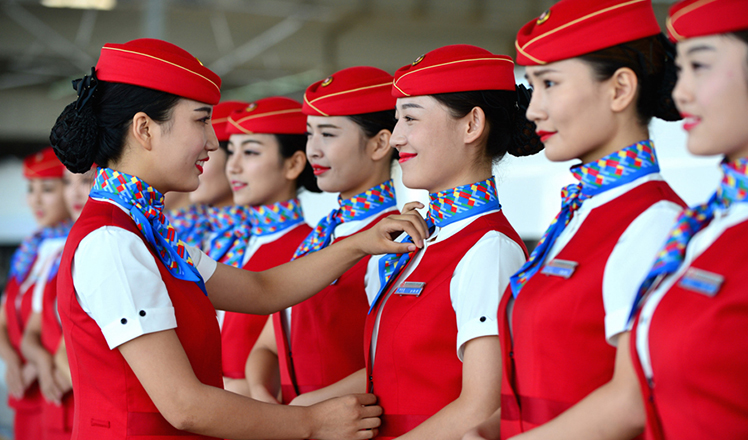
 Bullet train attendants strut new look in Xi'an
Bullet train attendants strut new look in Xi'an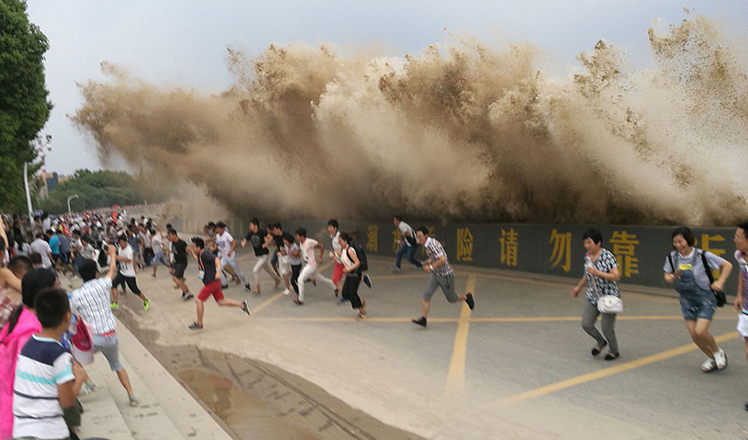
 Ten photos from around China: Sept 2 - 8
Ten photos from around China: Sept 2 - 8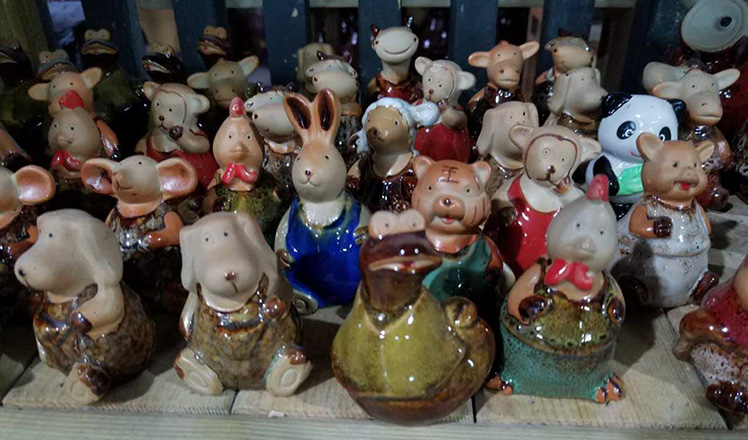
 Turning mud into work of art
Turning mud into work of art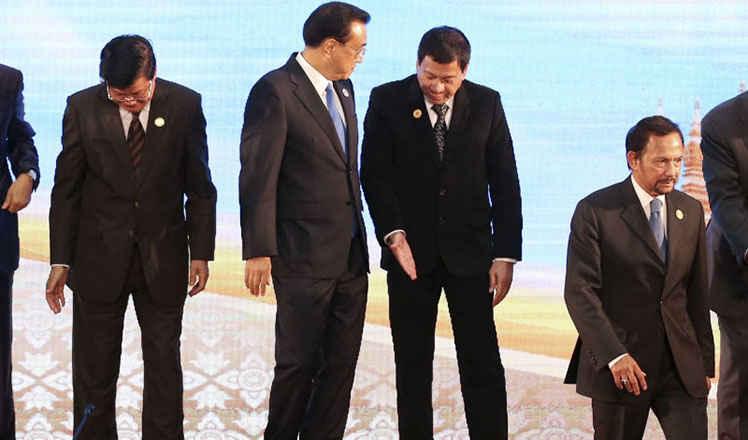
 Unforgettable moments of Premier Li at ASEAN meeting
Unforgettable moments of Premier Li at ASEAN meeting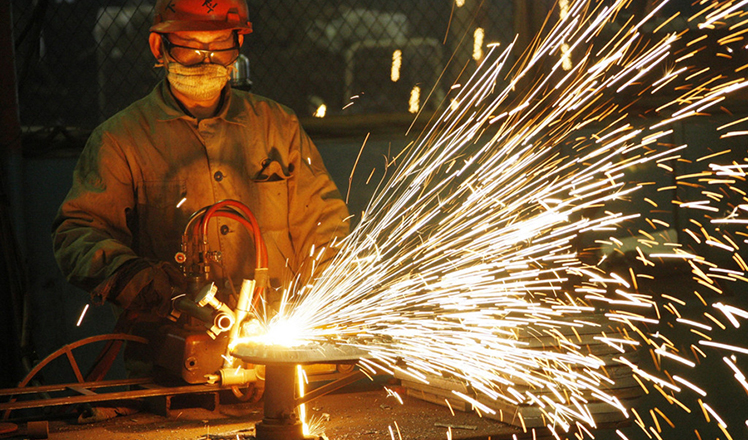
 Six policy signals China sent at G20 Summit
Six policy signals China sent at G20 Summit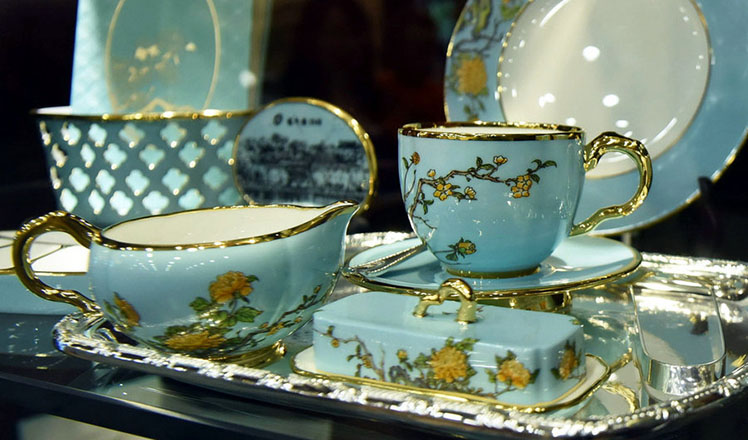
 'First Lady table ware' a hit in Hangzhou
'First Lady table ware' a hit in Hangzhou
Most Viewed
Editor's Picks

|

|

|

|

|

|
Today's Top News
Trump outlines anti-terror plan, proposing extreme vetting for immigrants
Phelps puts spotlight on cupping
US launches airstrikes against IS targets in Libya's Sirte
Ministry slams US-Korean THAAD deployment
Two police officers shot at protest in Dallas
Abe's blame game reveals his policies failing to get results
Ending wildlife trafficking must be policy priority in Asia
Effects of supply-side reform take time to be seen
US Weekly

|

|
